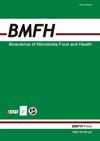丁酸梭菌治疗轻、中度艰难梭菌感染及对糖尿病的影响
IF 3.1
4区 医学
Q2 Agricultural and Biological Sciences
引用次数: 1
摘要
观察丁酸梭菌治疗成人艰难梭菌感染(CDI)的疗效。本研究于2013年1月至2020年4月在卫生福利部台南医院病房进行回顾性研究。根据IDSA/SHEA临床实践指南对CDI的疾病严重程度进行评分。治疗成功的定义是在治疗干预的6天内腹泻的解决,而不需要修改治疗方案。研究期间共有241例患者在住院期间发生CDI。99例轻中度CDI患者治疗成功率如下:甲硝唑69.4%;C.丁酸,68.2%;甲硝唑加丁酸梭菌占66.7%;口服万古霉素,66.7% (p=1.00)。治疗成功患者发生糖尿病的可能性低于治疗失败患者(38.2% vs. 61.3%, p=0.05)。单用丁酸梭菌或联用甲硝唑的患者腹泻持续时间短于单用甲硝唑的患者(3.1±2.0天或3.5±2.4天vs 4.2±3.5天);P =0.43或0.71),但差异无统计学意义。综上所述,单用丁酸梭菌或联用甲硝唑治疗CDI患者的成功率均不低于单用甲硝唑。糖尿病患者的存在是治疗失败的危险因素。本文章由计算机程序翻译,如有差异,请以英文原文为准。
Clostridium butyricum therapy for mild-moderate Clostridioides difficile infection and the impact of diabetes mellitus
The therapeutic effect of Clostridium butyricum for adults with Clostridioides difficile infection (CDI) was investigated. A retrospective study was conducted in medical wards of Tainan Hospital, Ministry of Health and Welfare, between January 2013 and April 2020. The disease severity of CDI was scored based on the Clinical Practice Guidelines of the IDSA/SHEA. Treatment success was defined as the resolution of diarrhea within six days of a therapeutic intervention without the need to modify the therapeutic regimen. In total, 241 patients developed CDI during hospitalization in the study period. The treatment success rates for the 99 patients with mild-moderate CDI among them were as follows: metronidazole, 69.4%; C. butyricum, 68.2%; metronidazole plus C. butyricum, 66.7%; and oral vancomycin, 66.7% (p=1.00). Patients with treatment success were less likely to have diabetes mellitus than those with treatment failure (38.2% vs. 61.3%, p=0.05). Patients treated with C. butyricum alone or in combination with metronidazole had shorter durations of diarrhea than those treated with metronidazole alone (3.1 ± 2.0 days or 3.5 ± 2.4 days vs. 4.2 ± 3.5 days; p=0.43 or 0.71), although the differences were not statistically significant. In conclusion, the treatment success rate of C. butyricum alone or in combination with metronidazole for patients with CDI was non inferior to that of metronidazole alone. The presence of diabetes mellitus in affected individuals is a risk factor for treatment failure.
求助全文
通过发布文献求助,成功后即可免费获取论文全文。
去求助
来源期刊

Bioscience of Microbiota, Food and Health
Immunology and Microbiology-Applied Microbiology and Biotechnology
CiteScore
5.50
自引率
3.20%
发文量
24
期刊介绍:
Bioscience of Microbiota, Food and Health (BMFH) is a peer-reviewed scientific journal with a specific area of focus: intestinal microbiota of human and animals, lactic acid bacteria (LAB) and food immunology and food function. BMFH contains Full papers, Notes, Reviews and Letters to the editor in all areas dealing with intestinal microbiota, LAB and food immunology and food function. BMFH takes a multidisciplinary approach and focuses on a broad spectrum of issues.
 求助内容:
求助内容: 应助结果提醒方式:
应助结果提醒方式:


